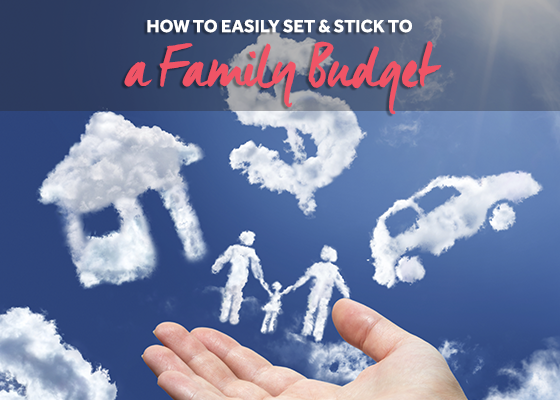The following post comes to you from our friends at Mormon Channel. I invite you to learn more about Mormon Channel and the content that is available for members and friends of the Church on mormonchannel.org
How To Easily Set & Stick To A Family Budget

Budgeting. This probably isn’t your favorite word in the English language, and your opinion of budgeting is undoubtedly that it’s a necessary evil, and one you wish could just work itself out.
Unfortunately, that’s not the case. As a family, you’re responsible for providing for your family’s needs and properly managing your finances to ensure that happens. But having and following a family budget shouldn’t be thought of as a constricting evil. Budgets are great! Budgets ensure your money is being spent how it needs to be spent. Budgets are how you gain financial control and freedom!
There are various reasons (excuses might be a better word) why people don’t make or don’t want to make a budget, but I think all these “reasons” can be grouped into three categories:
- They don’t want to know how their money is really being spent.
- They don’t want their spouse to know where a lot of their money is going each month.
- They think it takes too long to create a budget and too much time and effort to maintain one.
You may not want to know where all your money is going, but you need to know. And creating and maintaining a family budget doesn’t have to be a drawn-out, drastic, or boring process. You can make it a good, fun activity that involves the whole family. And here’s how!
First, don’t think of budgeting as a lengthy step-by-step process. Really, there are only three steps to create a basic family budget.
- Categorize how you currently spend your money.
- Assess your current spending to find out if it meets your financial priorities and goals you’ve set as a family.
- Monitor your spending for a month or couple of weeks, use whatever timeframe your budget is set for, to confirm it stays within your set guidelines or to find out what needs adjusting.
Second, you just need to make yourself sit down and create a budget — and create one that actually works for your family. And the following family budgeting tips will help you do just that.
Keep it simple. Your family budget doesn’t need to be elaborate. All your budget needs are an income category and an expenses category, and then within each category add in your subcategories, i.e. salary under the income category and food, mortgage, utilities, etc., under the expenses category, and a spot to record your total income and total expenses. To best plan and monitor your budget, have a column for what you plan to spend and what you actually spent during your budgeted time period under each category. Lds.org provides a very simple but great budget template for families to use, or you can use budgeting software to help get you started.
Document it. Most people are like me and remember things better if they write them down (or in this day and age type them). Budgets are made up of various categories, a lot of numbers, and adding and subtracting said numbers. Having your earnings and expenses documented helps you keep on track with your budget and goals, assists you with sticking to your budget and goals, provides discipline in terms of spending, and lets you clearly see how much money you have and where your money is going.
Set attainable goals. You’re more inclined to control your spending when your family is working toward a goal, such as going on vacation to Disneyland or paying off credit card debt. Try setting one goal at a time, and then once you attain said goal, set another one! Make your goals attainable, set a date you want to achieve them by, and make them ones your whole family wants and can benefit from so you have more willpower to not let your immediate wants overcome your long-term needs and goals.
Get the whole family involved. You are creating a family budget, so why not get your whole family involved? One person shouldn’t be in charge of the family finances or financial goals. Getting everyone involved leads to open communication and active participation, which helps prevent possible confusion or financial disagreements that no one wants. Involving both spouses and your kids is also a way for you as the parents to teach your kids the importance of correctly managing money, setting goals, hard work, and saving. You could even encourage your kids to make their own individual budgets if they’re old enough.
Keep trying. Don’t give up. There isn’t just one way to budget; there are several ways. So if you try one way to create and monitor your family budget and it’s not working out, don’t freak out; just try another way until you discover what works best for your family. More often than not, it’ll take you a couple of revisions before you find a budget that your family actually likes and can stick to.
Setting and sticking to a family budget may seem like a daunting task, but it shouldn’t and doesn’t have to be. Following small and simple methods, which will take time getting used to but will eventually become routine for you, are how your family is going to be financially set now and in the future. Family budgets are a great stress reliever — and we all could use a little less stress in our lives.






This is awesome! I’m so terrible at budgeting, but you are right, I really need to know how much is going out. If I’m more conscious about it, I bet I could save a lot more. I like that it doesn’t have to be elaborate or complicated too. It’s the sticking with it part I need to buckle down on. Great tips!
Great tips! We’re getting back to our budget after a year of crazy finances. I’ll have to remember some of these as we do that!